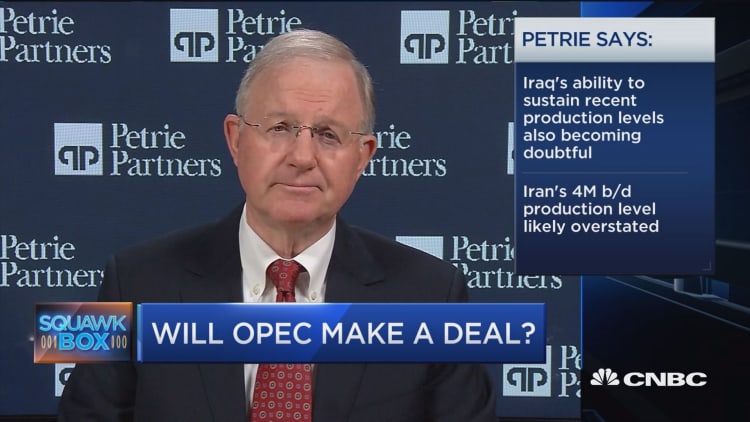
The world is watching Algiers for signs that oil producers will agree to freeze production, but many analysts see a devastating crude glut persisting no matter the outcome of the meeting.
Oil prices climbed more than 3 percent on Monday ahead of a hotly anticipated statement from OPEC members and other producers led by Russia as to whether they will act to stabilize oil prices. The rally came despite skepticism that the producers would reach a deal as they meet at the International Energy Forum in the Algerian capital.
Goldman Sachs said last week it is looking past the meeting and instead looking toward easing conflicts in Iraq, Libya and Nigeria that could return sidelined crude supply to markets and potentially push it back into glut territory.
"In our view, thawing relationships between parties in conflict in areas of disrupted production would be more relevant to the oil rebalancing than an OPEC freeze, which would leave production at record highs and could prove counter productive if it supported prices further and incentivized activity elsewhere," Goldman said.
Goldman still sees the crude market reaching a supply deficit of 230,000 barrels per day in the final six months of the year, but said a recovery remains fragile.
Its "conservative" estimate calls for returning supply from Iraq, Libya and Nigeria to add 100,000 barrels per day to global supply. But if an additional 500,000 barrels per day were to return, Goldman said, it would reduce its average 2017 price forecast for U.S. crude to $45 a barrel from its current $52.50 projection.
Crude emerging from conflict
While Iraq has signaled its willingness to cap production, operations also restarted this month at the northeastern Kirkuk oilfield following a breakthrough that eased a prolonged pricing and budget dispute between the central government in Baghdad and leaders of the semi-autonomous Kurdistan region.
That comes as Iraq has already pushed production to historic highs amid an international battle for market share as the oil price rout approaches a third year.
Meanwhile, Libya last week , raising the prospect that the country could begin clawing its way back toward its pre-2011 level of 1.6 million barrels a day — though a recovery to that level remains far off.
While the country remains fractured by internal strife, efforts to keep the crude flowing from ports have gotten support from heavy hitters. U.S. and British diplomats have spoken with rival factions in recent weeks in order to facilitate exports, fill the government's coffers, and make Libya stable enough to effectively fight ISIS militants, The Wall Street Journal reported Monday.
Nigeria also could be poised to produce more oil as militants known as the Niger Delta Avengers entertain a cease-fire following a months of infrastructure sabotage that cratered crude output, the country's lifeblood. However, as recently as this weekend, the Avengers had claimed responsibility for an attack on an export line.
Crouching bear, sleeping shale
Despite weeks of posturing by Russia's oil minister ahead of the meeting in Algeria, Moscow's top five oil firms have all pumped at record levels this year and say they intend to increase production in 2017, Reuters reported Monday. Russia is the world's top oil producer, and this handful of companies accounts for 75 percent of its output.
"There's been some indication, on paper at least, the Saudis and Russians are in agreement, but the facts cut the opposite way," Petrie Partners Chairman Tom Petrie told CNBC's "Squawk Box" on Monday. "It's pretty clear that Russia has intentions of increasing its production over the next three years in significant way."
"I think it's in their interest to look like they're playing ball with the Saudis," Petrie said, "but whether there's a real constructive agreement there is doubtful."
Even if Russia did reach a deal with OPEC members, many analysts think the freeze could backfire as rising oil prices would encourage U.S. producers to put rigs back to work. The number of oil rigs operating in U.S. fields has rebounded 32 percent to 418 rigs since the end of May as American drillers squeeze profits out of their best acreage, primarily in Texas and Oklahoma.

Saudi Arabia's two-year policy of allowing the market to rebalance on its own has largely been seen as an attempt to wash out U.S. shale producers, who must spend big to pummel rock formations with a mix of water, minerals, and chemicals to release oil and gas, a process called hydraulic fracturing.
Emma Richards, senior oil and gas analyst at BMI Research, said Monday it would actually be better in the long run if prices remain lower for longer to allow the rebalancing process to play out.
"We've seen massive reductions in the cost curve in U.S. shale, so there's a lot of capacity there that could be ramped up relatively quickly if prices recover too quickly or too strongly," she told CNBC's "Street Signs."
To be sure, about half of the respondents to a CNBC survey said a deal to rein in supply would have a meaningful impact on prices.


